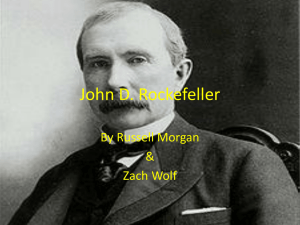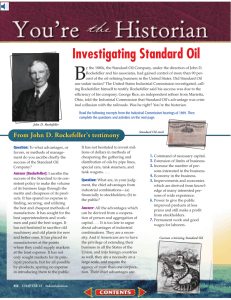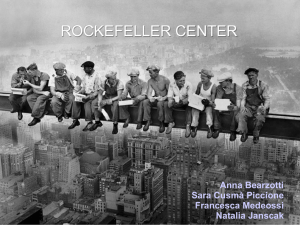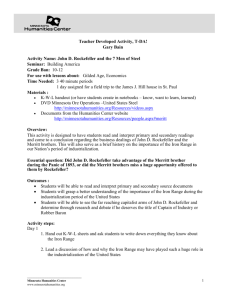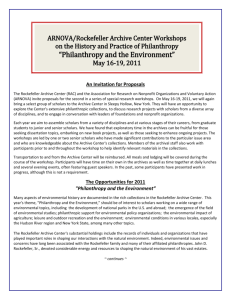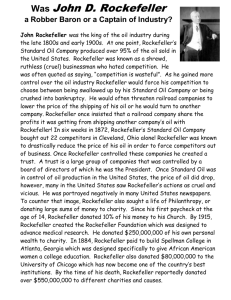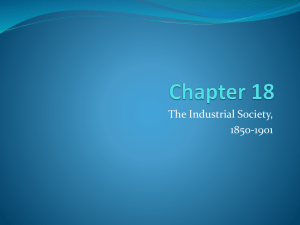The Rockefeller's Social Responsibility
advertisement
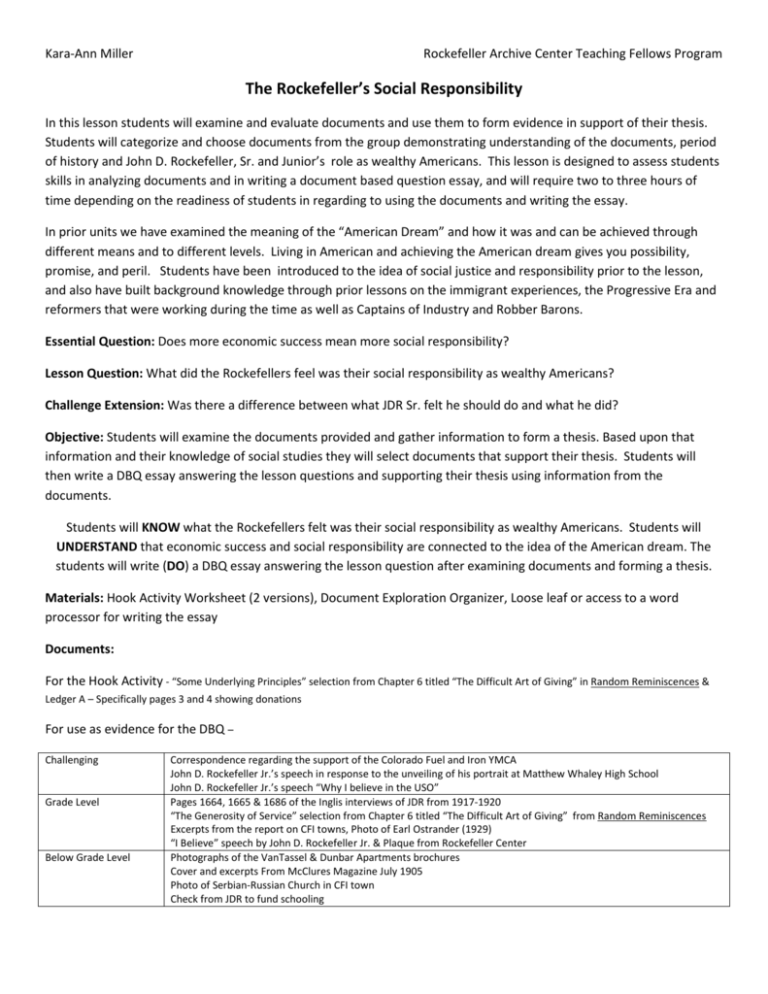
Kara-Ann Miller Rockefeller Archive Center Teaching Fellows Program The Rockefeller’s Social Responsibility In this lesson students will examine and evaluate documents and use them to form evidence in support of their thesis. Students will categorize and choose documents from the group demonstrating understanding of the documents, period of history and John D. Rockefeller, Sr. and Junior’s role as wealthy Americans. This lesson is designed to assess students skills in analyzing documents and in writing a document based question essay, and will require two to three hours of time depending on the readiness of students in regarding to using the documents and writing the essay. In prior units we have examined the meaning of the “American Dream” and how it was and can be achieved through different means and to different levels. Living in American and achieving the American dream gives you possibility, promise, and peril. Students have been introduced to the idea of social justice and responsibility prior to the lesson, and also have built background knowledge through prior lessons on the immigrant experiences, the Progressive Era and reformers that were working during the time as well as Captains of Industry and Robber Barons. Essential Question: Does more economic success mean more social responsibility? Lesson Question: What did the Rockefellers feel was their social responsibility as wealthy Americans? Challenge Extension: Was there a difference between what JDR Sr. felt he should do and what he did? Objective: Students will examine the documents provided and gather information to form a thesis. Based upon that information and their knowledge of social studies they will select documents that support their thesis. Students will then write a DBQ essay answering the lesson questions and supporting their thesis using information from the documents. Students will KNOW what the Rockefellers felt was their social responsibility as wealthy Americans. Students will UNDERSTAND that economic success and social responsibility are connected to the idea of the American dream. The students will write (DO) a DBQ essay answering the lesson question after examining documents and forming a thesis. Materials: Hook Activity Worksheet (2 versions), Document Exploration Organizer, Loose leaf or access to a word processor for writing the essay Documents: For the Hook Activity - “Some Underlying Principles” selection from Chapter 6 titled “The Difficult Art of Giving” in Random Reminiscences & Ledger A – Specifically pages 3 and 4 showing donations For use as evidence for the DBQ – Challenging Grade Level Below Grade Level Correspondence regarding the support of the Colorado Fuel and Iron YMCA John D. Rockefeller Jr.’s speech in response to the unveiling of his portrait at Matthew Whaley High School John D. Rockefeller Jr.’s speech “Why I believe in the USO” Pages 1664, 1665 & 1686 of the Inglis interviews of JDR from 1917-1920 “The Generosity of Service” selection from Chapter 6 titled “The Difficult Art of Giving” from Random Reminiscences Excerpts from the report on CFI towns, Photo of Earl Ostrander (1929) “I Believe” speech by John D. Rockefeller Jr. & Plaque from Rockefeller Center Photographs of the VanTassel & Dunbar Apartments brochures Cover and excerpts From McClures Magazine July 1905 Photo of Serbian-Russian Church in CFI town Check from JDR to fund schooling Procedure Hook Activity Giving can mean different things to different people. As seen in “Ledger A” JDR Sr. felt that giving was important from a young age. Listen and follow along as we read a passage from Random Reminiscences which are John D. Rockefeller Sr.’s own words. “It may be asked: How is it consistent with the universal diffusion of these blessings that vast sums of money should be in single hands? The reply is, as I see it, that, while men of wealth control great sums of money, they do not and cannot use them for themselves. They have, indeed, the legal title to large properties, and the do control the investment of them, but that is as far as their own relation to them extends or can be extended. The money is universally diffused, in the sense that it is kept invested and it passes into the pay envelope week by week. …It is the duty of men of means to maintain the title to their property and to administer their funds until some man, or body of men, shall rise up capable of administering for the general good the capital of the country better than they can.” -John D. Rockefeller, Sr. Random Reminiscences Answer the following question in a paragraph that includes a thesis and evidence. What did JDR Sr. feel he should do with his money? Group Activity – Document Exploration Following the Hook Activity students should begin to explore the documents in groups of 4 to 5 students. Students can be grouped heterogeneously or based upon their level of readiness. If students are seated based upon readiness then different documents can be distributed based on students needs. More lengthy readings, quotations or pictures can be substituted in. After time to discuss and explore the documents students should categorize the documents based upon their reactions, opinions and/or findings. The categories should be recorded so that students can refer back to them while making decisions on which documents will support their thesis. Students may also complete the note taking organizer on each of the documents to help in the formation of a thesis. Independent Activity – Thesis Formation Based upon the students understanding, analysis and interpretation of the documents they should write a thesis answering the lesson question. Once the student has formed their thesis they should select three to five documents that support their thesis and outline their document based question essay. Independent Activity – DBQ Essay Writing Depending on the time available students may peer conference with their essay outlines, or meet one on one with the teacher to discuss and deepen the analysis that they will include. Students should then begin to write. How long students have to work on the essay may depend on the amount of time given for writing in a testing situation, or if revisions or a writing workshop is to occur. Modifications: For the Hook Activity students should be given the handout showing a paraphrase of JDR Sr.’s words. Further paraphrasing or modification to the worksheet might be helpful such as an organization of space for a thesis and listing evidence. When categorizing the documents some students may have difficulty seeing the connections. Categories may be given to students such as: Evidence of Positive Things, Evidence of Negative Things, Money Being Spent, Evidence of Rockefellers Ideas, Evidence of Philanthropy, Captain of Industry, Robber Baron, etc. Some students may struggle with the formation of a thesis and might benefit from the following sentence starters and writing prompts: John D. Rockefeller was a ________________ (Captain of Industry or Robber Baron) and used his money for… As a wealthy American John D. Rockefeller and his family should have… The Rockefellers spent a great deal of money on… When comparing the way an immigrant in New York City lived and the way John D. Rockefeller lived… Once students have formed a thesis and outlined their ideas for the essay, it may be helpful to have students peer edit their outlines and give advice on what documents would support the thesis and any ideas that might enhance the analysis within the essay. Students might also find it helpful to meet with the teacher to discuss their ideas and do a “think aloud” to reflect upon their ideas. Challenge Extension Was there a difference between what he felt he should do and what he did? For students who have great strength in document analysis and writing, they may also be given a copy of the chapter titled “The Difficult Art of Giving” from Random Reminiscences which lays out Rockefellers ideas about charity, philanthropy and donations. Students should analyze this passage and include a discussion answering the challenge extension question within their essay. Kara-Ann Miller Rockefeller Archive Center Teaching Fellows Program John D. Rockefeller’s Social Responsibility Hook Activity Quotation Name ___________________________ Section ______ Date ____________ “It may be asked: How is it consistent with the universal diffusion of these blessings that vast sums of money should be in single hands? (How is it possible that some people have so much money?) The reply is, as I see it, that, while men of wealth control great sums of money, they do not and cannot use them for themselves.(The answer to that question is that, just because people have all that money doesn’t mean they can keep it to themselves.) They have, indeed, the legal title to large properties, and the do control the investment of them, but that is as far as their own relation to them extends or can be extended. The money is universally diffused (shared with others), in the sense that it is kept invested and it passes into the pay envelope week by week. …It is the duty of men of means to maintain the title to their property and to administer their funds until some man, or body of men, shall rise up capable of administering for the general good the capital of the country better than they can. (It is the job of the rich to use their money wisely until someone comes along that can do it better and for them)” -John D. Rockefeller, Sr. Random Reminiscences Answer the following question in a paragraph that includes a thesis and evidence. When writing remember the background knowledge you have on Captains of Industry, Robber Barons and the “American Dream”. What did John D. Rockefeller Sr. feel he should do with his money? __________________________________________________________________________________________________ __________________________________________________________________________________________________ __________________________________________________________________________________________________ __________________________________________________________________________________________________ __________________________________________________________________________________________________ __________________________________________________________________________________________________ __________________________________________________________________________________________________ __________________________________________________________________________________________________ __________________________________________________________________________________________________ __________________________________________________________________________________________________ __________________________________________________________________________________________________ __________________________________________________________________________________________________ __________________________________________________________________________________________________ __________________________________________________________________________________________________ __________________________________________________________________________________________________ __________________________________________________________________________________________________ __________________________________________________________________________________________________ __________________________________________________________________________________________________ __________________________________________________________________________________________________ Kara-Ann Miller Rockefeller Archive Center Teaching Fellows Program John D. Rockefeller’s Social Responsibility Hook Activity Quotation Name ___________________________ Section ______ Date ____________ “It may be asked: How is it consistent with the universal diffusion of these blessings that vast sums of money should be in single hands? (How is it possible that some people have so much money?) The reply is, as I see it, that, while men of wealth control great sums of money, they do not and cannot use them for themselves.(The answer to that question is that, just because people have all that money doesn’t mean they can keep it to themselves.) They have, indeed, the legal title to large properties (own a lot of land), and the do control the investment of them, but that is as far as their own relation to them extends or can be extended (but that’s all they do). The money is universally diffused (shared with others), in the sense that it is kept invested and it passes into the pay envelope week by week (used to pay workers). …It is the duty of men of means to maintain the title to their property and to administer their funds until some man, or body of men, shall rise up capable of administering for the general good the capital of the country better than they can. (It is the job of the rich to use their money wisely until someone comes along that can do it better and for them)” -John D. Rockefeller, Sr. Random Reminiscences Answer the following question in a paragraph that includes a thesis and evidence. When writing remember the background knowledge you have on Captains of Industry, Robber Barons and the “American Dream”. What did John D. Rockefeller Sr. feel he should do with his money? THESIS:____________________________________________________________________________________________ __________________________________________________________________________________________________ __________________________________________________________________________________________________ EVIDENCE:_________________________________________________________________________________________ __________________________________________________________________________________________________ Where is the evidence? (quote)__________________________________________________________________ ___________________________________________________________________________________________ EVIDENCE:_________________________________________________________________________________________ __________________________________________________________________________________________________ Where is the evidence? (quote)__________________________________________________________________ ___________________________________________________________________________________________ EVIDENCE:_________________________________________________________________________________________ __________________________________________________________________________________________________ Where is the evidence? (quote)__________________________________________________________________ ___________________________________________________________________________________________ Kara-Ann Miller Rockefeller Archive Center Teaching Fellows Program John D. Rockefeller’s Social Responsibility Document Exploration Organizer Name ___________________________ Section ______ Date ____________ Table Group _______________________ Category Title: Category Title: Documents Included: Documents Included: Category Title: Category Title: Documents Included: Documents Included: Category Title: Category Title: Documents Included: Documents Included: Document Bundle One Rockefeller Archive Center Document Based Question Lesson Documents photographed from pamphlets on the Paul Laurence Dunbar Apartments located at the Rockefeller Archive Center. No other race, or white or black. When bound as thou wert, to the rack, So seldom stooped to grieving: No other race, when free again, Forgot the past and proved them men. So noble in forgiving. -Dunbar’s Ode to Ethiopia Document Bundle One Rockefeller Archive Center Document Based Question Lesson Document Bundle One Rockefeller Archive Center Document Based Question Lesson Document Bundle One Rockefeller Archive Center Document Based Question Lesson Document Bundle One Rockefeller Archive Center Document Based Question Lesson Documents photographed from archived copy of July 1905 Edition of McClure’s Magazine located at the Rockefeller Archive Center. Document Bundle One Rockefeller Archive Center Document Based Question Lesson “Speaking of the Hoover campaign to feed the hungry children of Europe, my son told me last evening that the Rockefeller Foundation has contributed $1,000,000, the Laura Spelman Memorial $1,000,000, and my son has given $1,000,000. Out of a total of $23,000,000 to be collected in the nation for this purpose this one family has contributed $3,000,000.” -John D. Rockefeller -Excerpt from MR R VS TARBELL MC CLURE’S JULY 1905 page 1664 of Inglis Interviews- “The range of his giving is very wide. It may be said to be in with the distribution of Mr. Rockefeller’s own cast-off clothing. There is a well authenticated case, dating back only a few years, of a partly worn pair of shoes sent to a less fortunate friend with a personal note from Mr. Rockefeller.” -John D. Rockefeller -Excerpt from MR R VS TARBELL MC CLURE’S AUGUST 1905 page 1686 of Inglis Interviews- “I was trained from the beginning to work and to save. I have always regarded it as a religious duty to get all I could honorably and to give all I could. I was taught that way by the minister when I was a boy – taught by him and taught in many other ways. I loved to work. I was taught to save. Our family were poor people. I do not mean that we were poverty-stricken, but we had to work and to save if we were to live in fair comfort. My grandfather was a rich man – that is, for his time he was counted rich. In those days one who had his farm paid for and had a little money besides was counted as rich. Four and five thousand counted as rich. My grandfather had perhaps three or four times that. He had money to lend.” -John D. Rockefeller -Excerpt from MR R VS TARBELL MC CLURE’S AUGUST 1905 page 1665 of Inglis Interviews- Document Bundle One Rockefeller Archive Center Document Based Question Lesson Document Bundle Two Rockefeller Archive Center Document Based Question Lesson “Speaking of the Hoover campaign to feed the hungry children of Europe, my son told me last evening that the Rockefeller Foundation has contributed $1,000,000, the Laura Spelman Memorial $1,000,000, and my son has given $1,000,000. Out of a total of $23,000,000 to be collected in the nation for this purpose this one family has contributed $3,000,000.” -John D. Rockefeller -Excerpt from MR R VS TARBELL MC CLURE’S JULY 1905 page 1664 of Inglis Interviews- “The range of his giving is very wide. It may be said to be in with the distribution of Mr. Rockefeller’s own cast-off clothing. There is a well authenticated case, dating back only a few years, of a partly worn pair of shoes sent to a less fortunate friend with a personal note from Mr. Rockefeller.” -John D. Rockefeller -Excerpt from MR R VS TARBELL MC CLURE’S AUGUST 1905 page 1686 of Inglis Interviews- “I was trained from the beginning to work and to save. I have always regarded it as a religious duty to get all I could honorably and to give all I could. I was taught that way by the minister when I was a boy – taught by him and taught in many other ways. I loved to work. I was taught to save. Our family were poor people. I do not mean that we were poverty-stricken, but we had to work and to save if we were to live in fair comfort. My grandfather was a rich man – that is, for his time he was counted rich. In those days one who had his farm paid for and had a little money besides was counted as rich. Four and five thousand counted as rich. My grandfather had perhaps three or four times that. He had money to lend.” -John D. Rockefeller -Excerpt from MR R VS TARBELL MC CLURE’S AUGUST 1905 page 1665 of Inglis Interviews- Document Bundle Two Rockefeller Archive Center Document photographed from original document at the Rockefeller Archive Center Document Based Question Lesson Document Bundle Two Rockefeller Archive Center Document Based Question Lesson Document was photographed from the collection of documents about the Colorado mines owned by the Rockefeller family. This page is discussing the conditions within the mining camp as reported by an employee of the Rockefeller family. Documents are located at the Rockefeller Archive Center. Document Bundle Two Rockefeller Archive Center Document Based Question Lesson John D. R JR.'S CREED During this period, JDR Jr. expressed in one concise statement his philosophy of life. On July 8, 1941, in a radio broadcast appeal on behalf of the USO and the National War Fund, he gave this statement of principles that was widely reprinted under the title, "I Believe". In 1962 these words were included on a commemorative plaque that honors him at Rockefeller Center. “I Believe I believe in the supreme worth of the individual and in his right to life, liberty, and the pursuit of happiness. I believe that every right implies a responsibility; every opportunity, an obligation; every possession, a duty. I believe that the law was made for man and not man for the law; that government is the servant of the people and not their master. I believe in the dignity of labor, whether with head or hand; that the world owes no man a living but that it owes every man an opportunity to make a living. I believe that thrift is essential to well ordered living and that economy is a prime requisite of a sound financial structure, whether in government, business or personal affairs. I believe that truth and justice are fundamental to an enduring social order. I believe in the sacredness of a promise, that a man's word should be as good as his bond; that character not wealth or power or position - is of supreme worth. I believe that the rendering of useful service is the common duty of mankind and that only in the purifying fire of sacrifice is the dross of selfishness consumed and the greatness of the human soul set free. I believe in an all-wise and all-loving God, named by whatever name, and that the individual's highest fulfillment, greatest happiness, and widest usefulness are to be found in living in harmony with His will. I believe that love is the greatest thing in the world; that it alone can overcome hate; that right can and will triumph over might.” Document Bundle Two Rockefeller Archive Center Document Based Question Lesson Document Bundle Two Rockefeller Archive Center Document Based Question Lesson Page 145 of Random Reminiscences Chapter VI “The Generosity of Services”. Page is scanned from a copy of the book at The Rockefeller Archive Center. Document Bundle Three Rockefeller Archive Center Document Based Question Lesson “Father” meaning John D. Rockefeller the Captain of Industry/Robber Baron “John” is John D. Rockefeller Jr. Document Bundle Three Rockefeller Archive Center “Son” is John D. Rockefeller Jr. Document Based Question Lesson Document Bundle Three Rockefeller Archive Center Document Based Question Lesson Document Bundle Three Rockefeller Archive Center Document Based Question Lesson Document Bundle Three Rockefeller Archive Center Document Based Question Lesson Documents photographed from the program for the “Presentation of Portrait of Mr. John D. Rockefeller Jr. to the City of Williamsburg” located at the Rockefeller Archive Center
